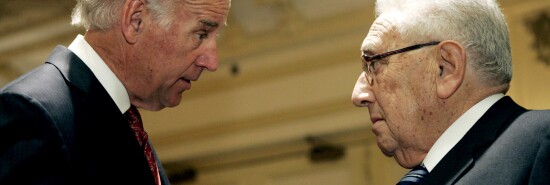
Biden must face Kissinger’s Eastern Mediterranean mistake
Michael Rubin
Video Embed
As the United States prepares to bury Henry Kissinger, an outsize figure in 20th century American diplomacy, many parts of the world continue to struggle with his legacy. Kissinger became famous for the breakthrough with communist China and won the 1973 Nobel Peace Prize for negotiating a ceasefire in Vietnam. More people should be aware of his involvement in the 1971 Bangladeshi genocide.
On two sides of the globe, however, Kissinger’s legacy and penchant for prioritizing short-term concessions and coddling dictatorships threatens to return regions to far bloodier war.
FLORIDA LAWMAKERS SLAM ‘CORRUPT DECISION’ TO SNUB FLORIDA STATE FROM COLLEGE FOOTBALL PLAYOFF
First, there is Taiwan. Chinese Premier Zhou Enlai played Kissinger’s vanity like a fiddle, winning concessions on Taiwan that communist leader Mao Zedong never expected to gain. By conceding Chinese sovereignty over Taiwan, Kissinger may have set China down the path to claim militarily a sovereignty it never had.
Then, there is Cyprus. In 1974, Turkey invaded Cyprus and established a beachhead comprising 3% of the island, ostensibly to protect the Cypriot Muslim population as the Greek junta sought to unify Cyprus with Greece. The Greek junta fell a week later, and Greece both returned to democracy and forfeited its claims to Cyprus. It was only then, as peace talks continued in Geneva to compel withdrawal, that Turkey invaded again, this time absent any casus belli. It was a blatant land grab. Turkish troops seized and ethnically cleansed a third of the country; the occupation continues to the present.
Kissinger sided with the Turks. “There is no American reason why the Turks should not have one-third of Cyprus,” he told President Gerald Ford. “The Turkish tactics are right — grab what they want and then negotiate on the basis of possession.”
He never explained why green-lighting Turkish aggression was an American interest. After all, Turks sided with the Axis in World War I, and Turkey remained neutral during World War II as the Nazis and fascists ravaged Europe. Only when Nazi defeat was certain did they join the allies. Kissinger later wrote he favored Turkey out of a desire to keep nuclear weapons stationed there, but, as with China, his concessions defied even his most ardent enemies’ expectations.
Kissinger’s Cyprus cynicism remains a lodestone over Western diplomacy. The 1994 Annan Plan failed largely because it promoted ethnic division above citizenship, failed to demilitarize the island, and allowed Turkish settlers, alien to not only Greek Cypriots but also Cypriot Muslims, to stay. While the Clinton administration prioritized Turkey’s accession to the European Union, the Turkish colonial land grab Kissinger blessed became an insurmountable impediment.
On Jan. 27, 1989, then-Sen. Joe Biden wrote to the American Hellenic Institute chairman, “We cannot lose sight of the fact that the rights of Greek Cypriots have been trampled upon, and we must ensure that their claims to ancestral land and property seized during the 1974 invasion are not compromised. Finally, we must send a signal to Turkey that until it has removed every last soldier from Cyprus, it will never be recognized as a full member of the international community.”
CLICK HERE TO READ MORE FROM THE WASHINGTON EXAMINER
Biden was right before he was wrong. Today’s divisions represent Kissinger’s legacy. In subsequent years, Kissinger even reportedly profited off his ties to Turkey as his consulting firm Kissinger Associates reportedly made introductions between American corporations and Turkish leaders.
As Cyprus becomes a regional energy hub and a democracy on the front line against autocracy, its importance to the West only grows. Every year, meanwhile, Turkey becomes an even greater liability to the West. Kissinger’s short-term solution now imperils American interests. His death is an opportunity not only for introspection but also for Biden to lead a bipartisan policy revision to put American interests and democracy above personal profit, colonial ambition, and embrace of dictatorship.
Michael Rubin (@mrubin1971) is a contributor to the Washington Examiner’s Beltway Confidential blog. He is a senior fellow at the American Enterprise Institute.
